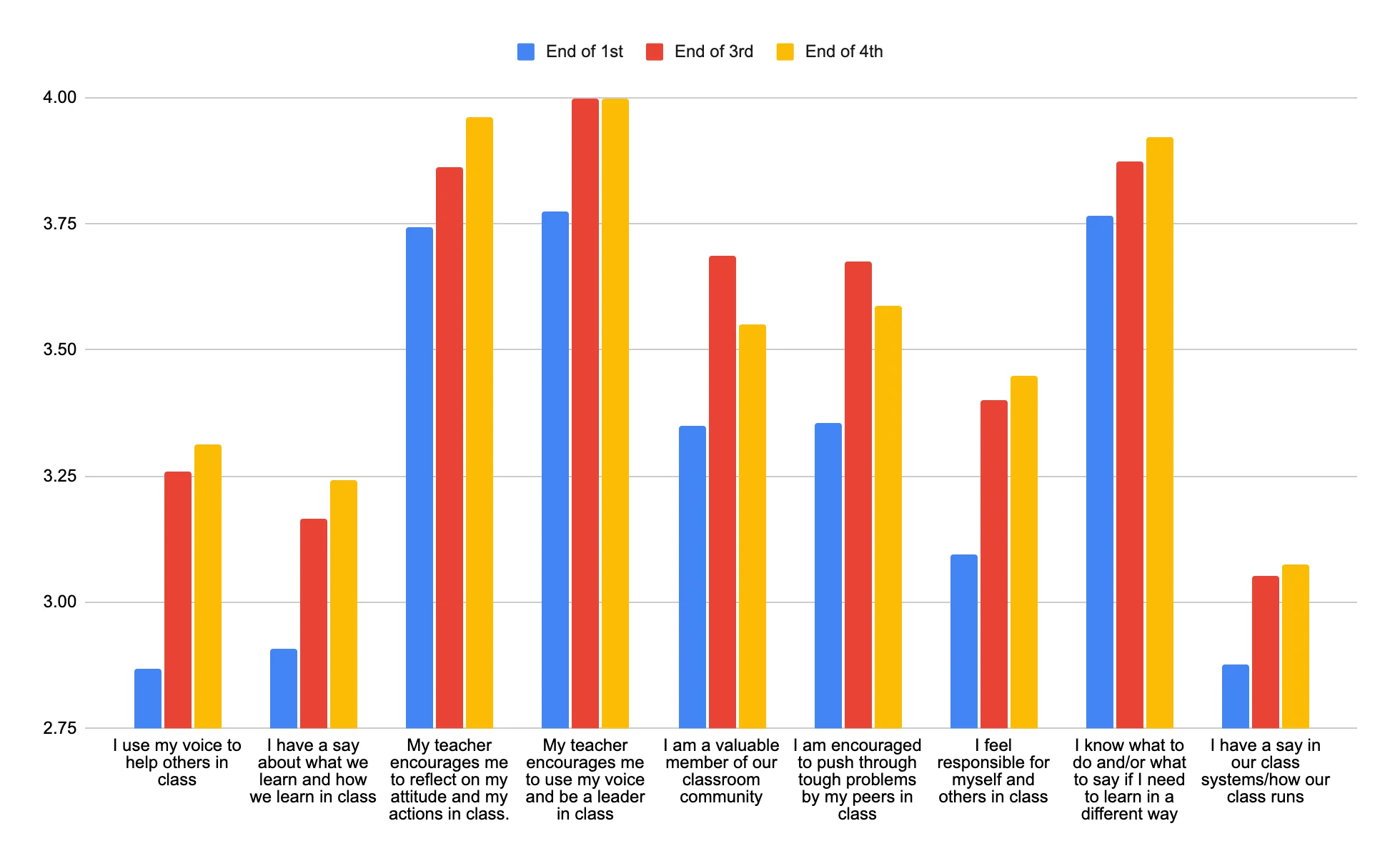DATE
July 3, 2025
AUTHOR
Liza Meiris, RPIA Teacher
CATEGORIES
Restorative Practices
SHARE
Restorative practices have long been central to my classroom environment – which felt natural given my personal philosophies as a social justice activist. In joining RPIA, I was excited to be a part of a community doing this important work, but I had no idea the length to which it would strengthen my practice and impact my students! The Sparkbook, the classes, the conversations with staff – RPIA pushed me to think beyond the simple definition of restorative practices and really engage in bringing students forward to take control of their own learning.
That doesn’t mean it was always easy. When I first saw the survey questions I was asked to give to my students, I panicked. “I am encouraged to push through tough problems by my peers in class.” “I am a valuable member of our classroom community.” “I have a say about what we learn and how we learn in class.” I, as the teacher, don’t have much of a say about what we learn in class and how we learn it – how could I possibly achieve growth in this way? Am I being set up to fail? After taking a few breaths from deeeeeeep in the abdomen – I read through the questions again and I realized that these are the questions that I WANT students to be able to say yes to. While I want my students to tackle a test with confidence and celebrate success – I’m not a believer that standardized test scores accurately measure student success. I’m not even sure that the many essays I assign in my senior English class are accurate measures of student or teacher success. But these questions – if even 75% of my students state boldly that “I feel responsible for myself and others in class” – I would know that I have succeeded as a teacher in teaching the whole child in a holistic and meaningful way. So, let’s give it a try!
Now, my survey results were not as low as I feared they would be in November. But in the following months I enacted a number of restorative practices throughout the year – some were small, some were huge undertakings. Some was simply a mindset change – instead of planning for what I would do to take control, I was planning for what my students would do to take control. Instead of trying to convince students to see my point of view, I was finding myself asking for theirs more. By the end of the year students were independently exploring books and authors, working in groups more effectively, writing their own creative works, and giving each other academic feedback verbally and in writing through writer’s critique meetings. What were the survey results? See for yourself.

But this wasn’t all I was to stretch and grow throughout RPIA. Panic fills my body again when I learn that I’m to videotape my students in small groups and turn them in for feedback. What? How? How am I supposed to…..breathe, Liza. At the time I was beginning to implement a strategy that I called “10-week groups.” It was explained to students that they would be in groups for an entire marking period to develop the skills necessary to succeed in college and in any career – because how many life pathways are there where you don’t have to work with a group of people ever? Students submitted who they did and didn’t want to work with, and I devised groups and gave them time to practice. Over the 10 weeks, they did group work that increased in intensity and expectations as I saw them absolutely flourish in their teams. The first few times they worked together; it was a typical group work environment, but I started to see shifts after just a couple weeks. Students started to take responsibility for their classmates. They started to help each other, read each other’s work, and give each other academic feedback. They started texting each other if someone was absent. They started planning group times to work on their assignments. Their grades on group assignments became the highest of all the assignments I’d given so far this year. By the time it came to the fishbowl as the capstone group activity – students were planning their own political conversation, holding their classmates’ accountable, showing critical thinking and metacognition skills, and working harder than I’ve ever seen. Not only was the panic of creating videos completely gone, but I was excited to be able to document it and watch my students shine!
As I write this, students are taking their Keystone exams. It will be a long time before we get those results, but I can say for sure today that RPIA has changed my classroom. Regardless of the data, I can just feel the difference. While I do have quantifiable goals for the survey data and for how I want students to improve on the political fishbowl, there’s an intangible excitement to connecting with students and breathing life, joy, and authentic intellectual engagement into the classroom. While I’m still excited for the summer, more importantly, I’m excited for next year and all the other ways I will explore what else I can learn and enact through RPIA. I’ve always considered myself a revolutionary – but RPIA has revolutionized my revolution!

